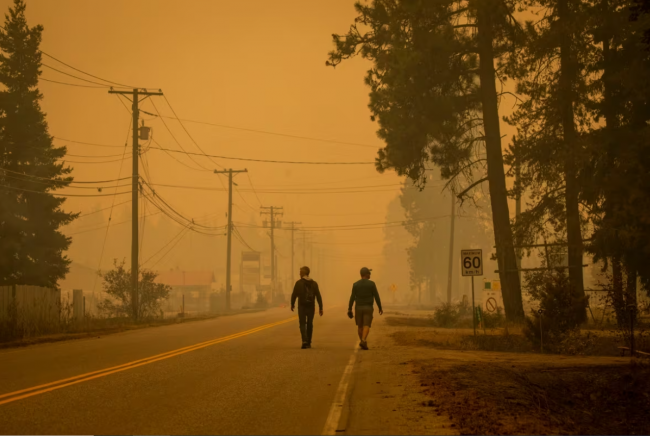Articles Menu

Nov. 16, 2023
While environmentalists are preparing for the COP28 climate summit in Dubai later this month, the UN's Intergovernmental Panel on Climate Change (IPCC) is also meeting to discuss its next assessments of the state of global warming.
After a record-shattering summer — with 2023 on pace to become the hottest year in recorded human history — one of the key decisions for the IPCC is whether to emphasize the prospect of runaway, irreversible global warming by issuing a special report on climate tipping points.
Tipping points are aspects of the climate system "prone to abrupt and or irreversible shifts" driven by positive feedbacks, said Tim Lenton, a climate scientist at the University of Exeter in the U.K. who has been researching tipping points for two decades.
For example, "as the Greenland ice sheet melts, the surface descends in altitude, which brings it into warmer air, which tends to accelerate the melting," he said.
Some of these feedbacks can become so strong they become "self-propelling," Lenton said, increasing warming even without the addition of more greenhouse gases.
The issue of tipping points has been briefly raised in previous IPCC comprehensive reports, but the next set of them isn't due for another five to seven years.
"It's just not adequate risk management or sensible to wait around for a slow cycle of reporting like that," Lenton said. "We have to be more fleet of foot."
While Lenton supports a UN report on climate tipping points, he's convening a group of more than 200 scientists who are producing their own tipping points report, outside the purview of the IPCC, to be released in time for COP28.
Thomas Stocker, a former co-chair of IPCC Working Group I, which studies the physical science of climate change, said the 2012 IPCC special report on managing risks of extreme events motivated him to call for a tipping points report.
He said it would respond to some of the persistent questions that have been around since 2001, when the IPCC first looked at what were then called "surprises" in the climate system.
Luke Kemp, a researcher at the Cambridge Centre for the Study for Existential Risk in the U.K., said one of the "scary" aspects of tipping points is that scientists still don't have clear knowledge of what the early warning signals are. Nor does the scientific community know when exactly "the feedbacks are likely to become self-amplified to the extent where they're difficult to handle."
Kristie Ebi, a professor of global health who studies the health risks of climate change at the University of Washington in Seattle, said addressing worst-case scenarios involving tipping points "helps give our future self a leg up and be in a place where we can be more resilient."
For example, she pointed to the construction of the bridge to P.E.I., completed in 1997, which was built to allow for one metre of sea-level rise. Adding the extra metre didn't cost that much more at the time and retrofitting would have been very expensive, she said.
In 2021, Naomi Oreskes, a professor of the history of science at Harvard University, argued that having thoroughly established the link between human activity and climate change, the IPCC should now focus on issues such as mitigation, adaptation and tipping points.
"Scientific resources are finite … it is really important for the scientific community to be strategic about where the bulk of the effort is placed," said Oreskes, co-author of the 2010 book The Merchants of Doubt: How a Handful of Scientists Obscured the Truth on Issues from Tobacco Smoke to Global Warming.
Stocker noted that climate scientists faced "fierce resistance" from governments in getting the concept of a "global carbon budget" approved in previous IPCC reports. But it has become one of the key pieces of information for measuring progress on emissions reductions.
"Had it not been for our ambition to have that controversial topic in the summary for policymakers, we would not be where we are today," Stocker said. "I think with tipping points, we can make the same arguments."
Oreskes said "the whole point of the tipping point report is to say it's not too late to avoid the worst catastrophes, like the dieback of the Amazon or the collapse of the West Antarctic ice sheet."
Since the IPCC operates on consensus-based decision-making, Canada would need to agree to commission a special report on tipping points.
"We support science, we support the development and the better understanding of climate science and its impact," Environment Minister Steven Guilbeault said in an interview. "And if that means, for example, supporting a special report on tipping points, it's certainly something that I would be supportive of."
Regardless of how the climate community examines the tipping points, the danger of crossing them is clear.
"If you cut off a leg of a starfish, the starfish can grow that limb back," Oreskes said. "But if you cut off the leg of a human, we don't grow legs back. Most of our ecological systems are more like people than they are like starfish."
[Top photo: Two men walk along a road in Scotch Creek, B.C., as wildfire smoke fills the air on Aug. 19, 2023. (Ben Nelms/CBC)]